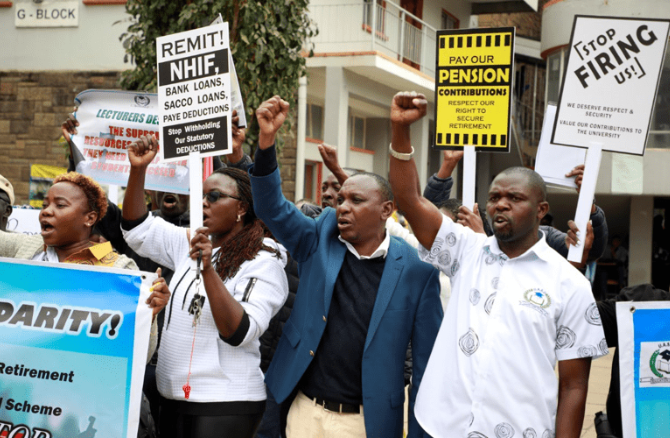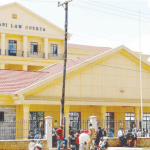Hundreds of first-year and continuing students at the Technical University of Kenya who reported for classes yesterday were left stranded in the corridors due to a lecturers’ strike demanding better pay. The strike caused significant disruption, especially for first-year students eager to begin their higher education journey, many of whom had traveled long distances to reach the city.
Freshmen Oscar Odhiambo and Bill Clinton, both from Kisumu County, were among those affected, still holding onto their briefcases as the strike brought the entire university to a halt.
“I came early today for orientation before I can proceed to pay for my hostel so that I can start my classes on Wednesday,” said Odhiambo, who has enrolled for a bachelor’s degree in Mechanical Engineering.
“Now I’m confused. I had paid my hostel fees and secured my loan from the Higher Education Loans Board. It is not tenable for me to live in the city doing nothing. I feel the problem here is the government, because it has failed to tackle the issues that are being raised by the lecturers.”
His colleague Clinton, who also appeared to be in a quandary because of the strike, expressed his anger that he could not start his lessons as planned despite fulfilling all the TUK admission requirements.
“I’m not feeling well, because of the way the school is right now. As a first-year student, I was ready to begin my journey of moulding my dream career and that’s what brought me here. The joy of attending my first lesson at university has been rudely cut short,” Clinton said.
Online Lessons
Both students urged university administrators to ensure that online lessons are up and running so that they could familiarise themselves with courses as they awaited lecturers to resume teaching.
“If TUK could even start online classes, we can take up the lessons through e-learning. We will also be consulting those ahead of us in the second and third year so that we can get a clue on where we’re going to start,” Odhiambo said.
TUK lecturers who are members of the national UASU union yesterday downed their tools, spelling out a myriad of demands that must be met before they resume work.
They said they had issued a seven-day strike ultimatum to the university council that lapsed yesterday and that is why they boycotted lecture halls.
They are demanding equitable pay and full salaries at the end of the month.
“We want to be paid salaries like [at] any other university, not at a rate lower than what the government is paying [at] other universities. Further, our statutory and third-party deductions, including NHIF, NSSF, pension, bank loans, insurance and many others, must be remitted instantly,” said UASU-TUK chapter secretary general Fred Sawenja.
“Some of our colleagues have been taken to court by financial institutions because the employer has made deductions and has not remitted [them].”
Sawenja accused TUK administrators of turning a blind eye to the demands of union members who, he said, are working under deplorable conditions.
“We are public servants employed by the Kenyan government, working diligently, offering service … to the public and more so developing human resources for this particular country,” he said.
“But for many years, we have been subjected to labour and socio-economic injustices, and we have taken a path that eventually has led us to this industrial action.”
He added: “Ideally when an employer is given a strike notice, it is an opportunity for them to approach members of the union for dialogue.
“Unfortunately for us, our employer chose a path of contempt, a path of disrespect, not having any intention to talk to us or even care to address any of the six items that we listed in our strike notice.”
Salary agreement
Their chairman Jacob Musembi vowed that union members would not resume work until all their demands were addressed to their satisfaction.
“Where in this world do you find an employee who works for 50 percent of the pay, as if we give 50 percent of our input in our work?” Musembi asked.
“Where on this earth do you find an employee who works day in, day out for more than 30 years and goes home without any pension? Where on earth do you find an employee whose health is not catered for by the employer?”
UASU National Deputy Treasurer Edwin Keter criticized the Technical University of Kenya (TUK) council for not honoring the current collective bargaining agreement and for paying TUK academic staff salaries that were not negotiated. Keter also highlighted issues with delayed payments, noting that staff sometimes receive only 40 percent of their salaries. Additionally, he pointed out that TUK retirees are facing a financial crisis due to the imminent insolvency of their pension scheme.



